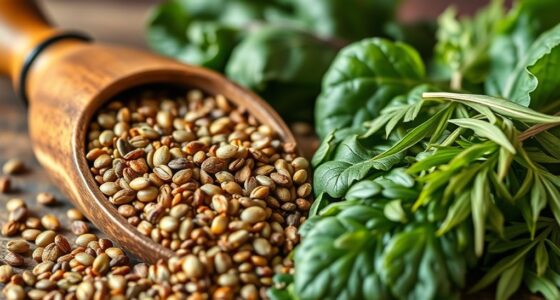To prioritize high-quality protein sources, focus on incorporating both animal and plant options into your diet. Choose lean meats, fish, eggs, and dairy for complete, highly bioavailable proteins. Pair plant-based sources like beans, lentils, and quinoa to create complete proteins through mixing. Pay attention to preparation methods such as grilling or steaming to keep your meals healthy. Balancing these sources and staying mindful of portion sizes can boost your health and energy—learn more to optimize your intake.
Key Takeaways
- Incorporate a mix of animal sources like lean meats, fish, eggs, and dairy for complete, highly bioavailable proteins.
- Include diverse plant-based proteins such as beans, lentils, and quinoa to boost fiber and nutrient intake.
- Choose healthy preparation methods like grilling, baking, and steaming to preserve protein quality and reduce added fats.
- Balance plant and animal proteins to maximize amino acid coverage and support overall health.
- Monitor portion sizes and regularly vary protein sources to meet dietary needs and promote sustainability.

Choosing the right protein sources is essential for supporting your overall health and well-being. When it comes to fueling your body, selecting high-quality proteins ensures you get the necessary amino acids to promote muscle growth, repair tissues, and maintain a strong immune system. You have a variety of options, including plant-based proteins and animal-derived sources, each offering unique benefits. Understanding how to incorporate these into your diet will help you make informed choices that align with your health goals and ethical considerations.
Choosing high-quality proteins supports your health, muscle growth, and immune function with diverse plant and animal options.
Plant-based proteins are an excellent choice if you’re looking to reduce your intake of animal products or follow a vegetarian or vegan diet. They include foods like beans, lentils, chickpeas, tofu, tempeh, quinoa, nuts, and seeds. These sources are often rich in fiber, vitamins, and minerals, which benefit your digestive health and overall nutrient profile. Keep in mind that some plant-based proteins are incomplete, lacking one or more essential amino acids. However, by combining different sources—like rice and beans or hummus and whole grain bread—you can create complete protein profiles. Incorporating a variety of these foods regularly ensures you’re meeting your amino acid needs while enjoying a diverse and flavorful diet.
On the other hand, animal-derived sources tend to be complete proteins, providing all essential amino acids in the right proportions. These include lean meats like chicken and turkey, fish, eggs, dairy products, and certain seafood. They are highly bioavailable, meaning your body absorbs and uses these proteins efficiently. If you rely on animal-based sources, focus on choosing lean options and preparing them healthily—grilling, baking, or steaming—to maximize benefits and minimize added fats or sodium. Including a mix of these sources can help you meet your daily protein requirements with minimal effort, especially if you’re active or trying to build muscle.
Balancing plant-based and animal-derived proteins allows you to enjoy the advantages of both worlds. For example, plant proteins contribute fiber and phytochemicals, whereas animal sources provide highly digestible proteins with a complete amino acid profile. By diversifying your protein intake, you’re not only supporting your physical health but also promoting dietary sustainability and ethical considerations. Additionally, monitoring your intake of credit card debt and managing your finances responsibly can parallel the importance of balanced nutrition, ensuring overall stability in your lifestyle. Remember, the key is moderation and variety. Prioritize high-quality proteins from both categories, paying attention to preparation methods and portion sizes. Doing so helps you optimize your nutrition, maintain energy levels, and support your overall health, all while enjoying a tasty and varied diet.
Frequently Asked Questions
How Do Plant-Based Proteins Compare to Animal-Based Options?
Plant-based proteins offer benefits like being lower in saturated fat and rich in fiber, making them a healthy choice. However, they often have drawbacks such as incomplete amino acid profiles compared to animal proteins. You might need to combine different plant sources to get all essential amino acids. Animal-based options usually provide complete proteins, but they can be higher in cholesterol and saturated fats. Balancing both can help you meet your nutritional needs effectively.
What Are the Best High-Protein Snacks for Busy Lifestyles?
Think of your snack as a trusty toolbox, ready to fuel your busy day. You should opt for portable options like Greek yogurt, mixed nuts, or protein bars that are easy to prep and carry. These snacks pack a punch of high-quality protein, keeping you energized. Quick to prepare, they fit seamlessly into your schedule, turning hectic moments into opportunities for a nourishing boost whenever hunger strikes.
Can High-Protein Diets Affect Kidney Health?
High-protein diets can sometimes cause kidney strain, especially if your protein intake is excessive or you have pre-existing kidney issues. When you consume too much protein, your kidneys work harder to filter waste, which may harm their function over time. If you’re healthy, moderate high-protein intake is usually safe, but it’s wise to consult a healthcare professional to guarantee your diet doesn’t negatively impact your kidney health.
How Much Protein Do Different Age Groups Need Daily?
Did you know that adults aged 19-50 need about 46 grams of protein daily, while seniors over 70 require around 56 grams? Your protein intake should align with your age-specific needs to stay healthy. If you’re active or pregnant, your needs might be higher. Keep track of your daily consumption to guarantee you’re meeting your body’s requirements, supporting muscle maintenance, and overall well-being.
Are There Sustainable Ways to Source High-Quality Proteins?
Yes, you can source high-quality proteins sustainably through aquaculture innovations and insect-based proteins. Aquaculture techniques are improving to reduce environmental impacts, making fish and seafood more eco-friendly. Insect-based proteins are a nutrient-rich, low-impact option that requires less land and water. By choosing products from these sources, you support sustainability while ensuring you get high-quality protein for your diet.
Conclusion
Just like choosing the best tools for a job, prioritizing high-quality protein keeps your body running smoothly. I once met someone who swapped out processed snacks for lean meats and beans, and they felt more energized in just weeks. Think of your diet as a garden—planting the right seeds yields a healthier, stronger harvest. Focus on quality, and you’ll nourish your body to thrive, not just survive. Your health is worth the best choice every time.









